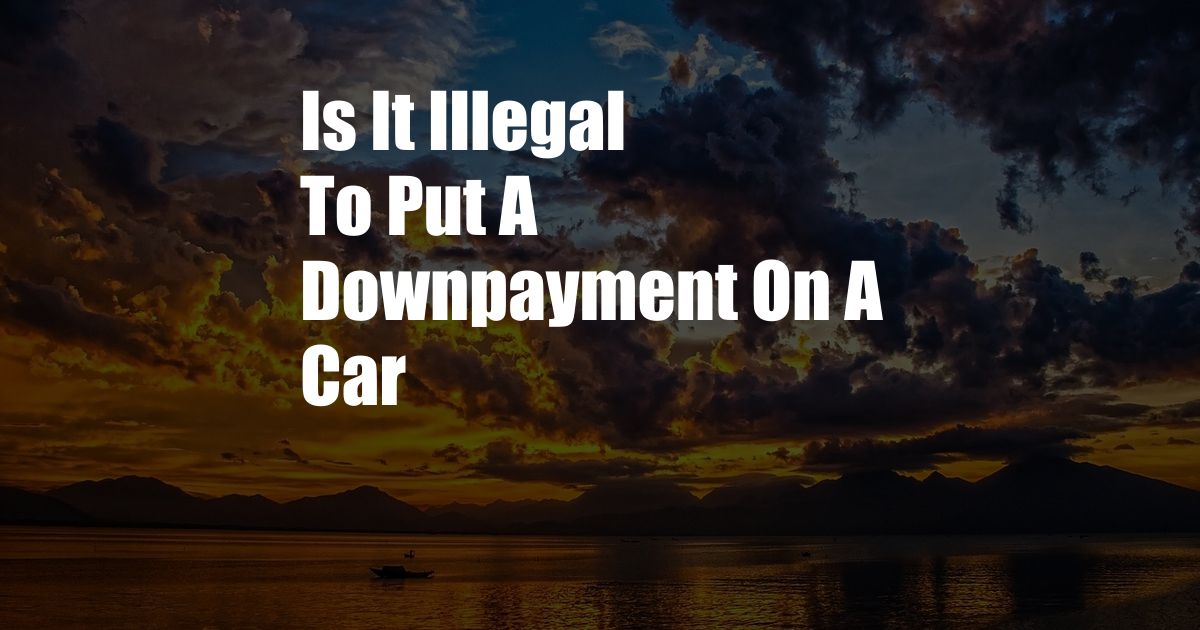
Is It Illegal to Put a Downpayment on a Car?
Introduction:
In the fast-paced world of car buying, it’s easy to get caught up in the excitement and make hasty decisions. One question that often arises is whether it’s illegal to put down a deposit on a car. To clear up any confusion, let’s delve deep into the legal aspects and practical considerations surrounding this topic.
Legality of Downpayments
No, it is not illegal to put a downpayment on a car. In most jurisdictions, downpayments serve as a form of good faith, demonstrating a buyer’s commitment to purchase the vehicle. However, it’s crucial to understand the terms and conditions associated with downpayments to avoid any potential disputes.
Deposit vs. Downpayment
A “deposit” typically refers to a small sum of money paid as a token of intent to purchase a car. It’s usually refundable if the buyer changes their mind. In contrast, a “downpayment” is a larger payment that reduces the total purchase price. Downpayments are typically non-refundable unless otherwise agreed upon in writing.
Importance of a Written Agreement
To protect both parties involved, it’s essential to have a written agreement that outlines the terms of the downpayment. This agreement should specify the amount paid, the date the downpayment was made, and any conditions or restrictions attached to it. In the event of a dispute, the written agreement will serve as legal proof of the downpayment arrangement.
Tips for Downpayments
- Negotiate a fair amount: Downpayment amounts vary depending on the type of car and its value. Negotiate a reasonable amount that you can afford to pay.
- Get a receipt: Always obtain a receipt or written acknowledgment from the seller confirming the downpayment.
- Set a timeline for purchase: Establish a clear timeline for when the remainder of the purchase price will be paid. This prevents misunderstandings and ensures timely completion of the sale.
- Consider refundability: If possible, negotiate for a refundable downpayment in case unforeseen circumstances prevent you from purchasing the car.
Expert Advice
Industry experts recommend that buyers carefully review the terms of the downpayment and seek professional advice if necessary. Downpayments should not be impulsive decisions; thorough research and due diligence are essential to ensure a smooth and legally sound car purchasing experience.
FAQs on Downpayments
Q: Can I back out of a car purchase after making a downpayment?
A: Yes, you may be able to back out depending on the terms of the downpayment agreement. If the agreement states the downpayment is non-refundable, you may forfeit the payment.
Q: What recourse do I have if the seller fails to deliver the car after receiving a downpayment?
A: Contact the seller immediately and request a refund. If the seller refuses, you may consider filing a complaint with consumer protection agencies or pursuing legal action.
Conclusion
Understanding the legality and practicalities of downpayments on cars is crucial for informed decision-making. As long as the downpayment is clearly documented and agreed upon in writing, it’s a common practice that can facilitate car purchases. Remember to negotiate fairly, seek professional advice when needed, and approach downpayments with due diligence to avoid potential pitfalls.
Call to Action
If you’ve been considering purchasing a car, it’s wise to familiarize yourself with the nuances of downpayments. By following the tips and expert advice outlined above, you can confidently navigate the car buying process and protect your interests.
Are you interested in learning more about car purchasing or downpayments? Leave a comment below to share your thoughts or ask any questions.